
Fall/Winter 2024 You, your community, and your city Showcasing Indigenous voices Storytelling at Native Earth Performing Arts


Fall/Winter 2024 You, your community, and your city Showcasing Indigenous voices Storytelling at Native Earth Performing Arts



Tenants provide input on how TCHC can incorporate the CABR Strategy in the next Strategic Plan
As part of TCHC’s 2025-2029 Strategic Planning process, The Centre for Advancing the Interests of Black People (The Centre) team hosted a tenant focus group in September to get tenant input. Specifically, they looked at how TCHC could incorporate the Confronting Anti-Black Racism (CABR) Strategy and the work of The Centre into the next Strategic Plan.
This was the first time TCHC engaged in conversations about confronting anti-Black

racism, and equity, diversity, and inclusion in its Strategic Plan. On behalf of the Centre, we thank all Black tenant leaders who engaged in this process and provided their time to share feedback with us.
To view a copy of the feedback report from the meeting, please visit torontohousing.ca/CABR.
For more information about TCHC’s Strategic Plan, visit torontohousing.ca/strategic-plan.
The Centre re-launched the Centre Community Funds this fall. The Centre team is excited to announce that it will fund up to 10 community projects or initiatives as part of its 2024 Centre Community Funds program.
Approved projects will receive up to $5,000. Some projects and events may be implemented in communities as early as mid-December 2024.
All Centre Community Funds projects must be completed by Monday, March 3, 2025. Tenants must submit their project completion reports by Monday, March 10, 2025.
Congratulations to the tenants and tenant groups who received the 2024 Centre Community Funds!
To learn more about the Centre Community Funds, visit torontohousing.ca/ccf.
Native Earth Performing Arts (NEPA) is Canada’s oldest professional Indigenous theatre company. They are located inside the Daniels Spectrum building in Regent Park and are hosting their 42nd season. The company is dedicated to creating and showcasing artistic expressions of the Indigenous experience in Canada.
The stories produced at NEPA are rooted in the Indigenous experience. They are shaped by conversations with artists. The stories are also influenced by what’s happening in Indigenous communities across Canada. “We are constantly talking to the artists, learning about what they are interested in telling people and the stories they want to share,” said Joelle Peters, NEPA’s Artistic Director.
Joelle is from the Walpole Island First Nation in Southwestern Ontario. She has been with NEPA for eight years. A lifelong artist, she is known for her work as an actor, playwright, and storyteller. She oversees the production and storytelling at NEPA with Managing Director, Himanshu Sitlani. Originally from India, Himanshu

moved to Toronto in 2010 and has been with NEPA for several years. He has a rich background in theatre, having worked as an actor, stage manager, and sound designer.
“These stories need to be showcased, not just in Toronto but across the country.”
NEPA presents a wide range of performances that give audiences an opportunity to learn about and connect with Indigenous culture on a deeper level. For example, Frances Končan uses satire in her comedy “Women of the Fur Trade” to talk about Indigenous history and Louis Riel. In another play, “What We Carry”, Barbara Diabo uses traditional hoop dancing to tell her personal story as a matriarch in her community. “These stories need to be showcased, not just in Toronto but across the country,” said Himanshu.
On top of producing shows, NEPA is also dedicated to supporting artists at all stages of their careers. They help emerging artists looking to transition from actor to writer as well as veteran producers looking to learn more about directing. NEPA helps jumpstart journeys with workshops, residencies, and professional development. “It’s incredible to work with and uplift Indigenous artists, helping them tell their stories” said Joelle.
NEPA actively creates funding opportunities for Indigenous creators. This allows artists to focus on their work without financial stress so that diverse Indigenous stories continue to be told. “40 Seeds for 40 Seasons” is an initiative that gave 40 Indigenous artists $4,000 for creative projects, with no pressure for specific outcomes. They also offer mentorship programs pairing emerging artists with experienced professionals to help their stories shine. These relationships help young artists build skills and a support network in the industry.
“This season, we are honoured to present works that speak to self-expression and challenging expectations,” said Joelle. “The artists we’re working with throughout 20242025 are exploring intersectionality within dance, theatre, and lived experiences.”
NEPA celebrated the start of their 2024 to 2025 theatre season with a community fire and gathering. The first performances of the season debuted during “Weesageechak Beings to Dance 37”, their Annual Development Festival of Indigenous Work. These performances ran from November
21 to December 1. They featured over 13 projects at their Aki studio in Regent Park and included talent from Toronto and across Canada.

NEPA puts on a large number of shows each year.
Native Earth Performing Arts is more than just a theatre company. It is a source of hope and support for Indigenous artists. By continuing to uplift Indigenous voices, NEPA demonstrates how art can foster understanding and connection among communities.
“Just come out and watch. The missing piece is you.”
For those interested in going to a performance, NEPA offers discounted tickets to residents of Regent Park. They also offer a sliding scale for all ticket prices. “Just come out and watch,” said Himanshu. “The missing piece is you.”
Visit nativeearth.ca to learn more about their programs and productions.
Did you know that the Responsible Personal Accessibility in Toronto Housing (R-PATH) Committee works with TCHC on community accessibility projects?
These projects happen in spaces used by all tenants inside a community. This includes areas like mailboxes, lobbies, community rooms, laundry rooms, and more. They also cover outside spaces, like accessible parking, gardens and pathways.
An accessibility project starts with a visit to the community by R-PATH and staff from TCHC’s Design and Engineering department. Together, they look at what changes are needed to make areas more useable, functional, and accessible. This is called a “scope.”
R-PATH and TCHC staff also meet with the community to get feedback on the project. We ask how your community functions in the current space, what is missing, and what you would like to do in the future. The projects also include upgrades to cabinets and appliances in community rooms. The community also votes for the colours they want to see in the upgraded spaces.
A project has several stages:
• Create the design
• Find a consultant to make the drawings
• Get building permits from the City of Toronto
• Get funding approvals
• Hire a contractor
This can take several months. Often projects are “scoped” a year or more before construction starts. There may be more community meetings to share updates and information during the project.
These projects make communities more accessible and useable for everyone, resulting in a beautiful space that will make tenants proud to live there.
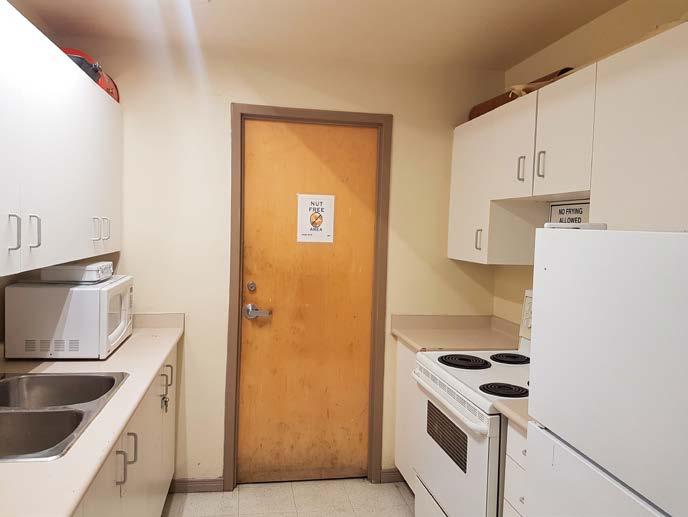

A kitchen before accessibility improvements
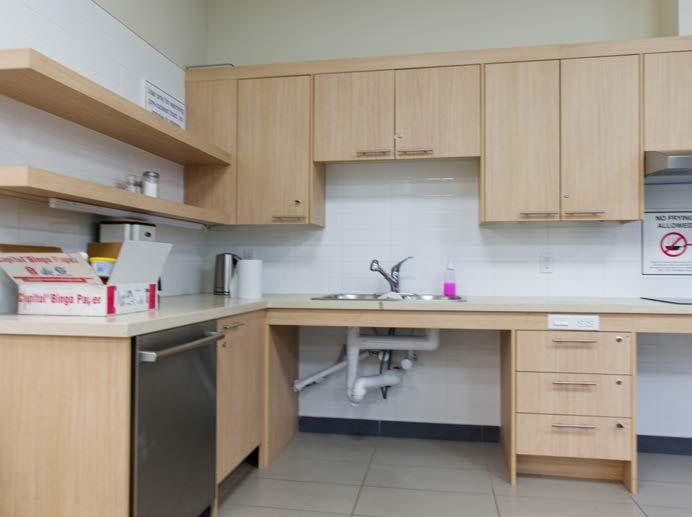

A kitchen after accessibility improvements

Are you passionate about advocating for people with disabilities in TCHC?
About R-PATH:
We are a tenant-led group that works with TCHC senior management to identify and remove accessibility barriers.
The Responsible Personal Accessibility in Toronto Housing (R-PATH) Committee’s work covers many areas of accessibility, including policy review, accessibility build standards, consultations about accessibility in common spaces, tenant engagement, and more!

How to apply:
R-PATH usually meets virtually, a minimum of 10 times a year. Potential members must be current TCHC tenants. Applicants should have:
• An understanding of the issues affecting disabled tenants and staff.
• The desire to help all TCHC communities.
• Strong problem-solving skills.
• Ability to work effectively with different groups.
• Regular access to email and internet.

• Learn more about R-PATH online at torontohousing.ca/R-PATH.
• If interested, email Chair Cathy Birch at cbirch619@msn.com.
• Select applicants will be chosen for a panel interview with current R-PATH members.

Please review this section for important updates from TCHC
On Tuesday, October 1, our new District-based model for building services staff was implemented.
What does this mean?
• Each Region has now been divided into three Districts and each District has a District Manager.
• Every District has two Sub-Districts, each with a District Supervisor.
• Building Services, Maintenance, and Cleaning staff now report to their District Supervisor.
How does this affect me?
• Your building now belongs to a District. The geographical re-alignment should not affect your day-to-day interactions with staff, or where you can go for services. These changes are mainly for internal use.
• Your building level staff have not changed.
• Some tenant complaints may be escalated to District Supervisors or Managers to resolve.
• If you have questions about who your local staff are or where you can go for services, please check the Building Staff Contact Sheet posted in your building.
• You can also call the Client Care Centre at 416-981-5500 for general inquiries.



Your unit door is a fire door. Fire doors are required to fully close and latch. Leaving fire doors open allows smoke and fire to spread into the unit, causing damage to your property. Check that your door is secure. If it isn’t, notify your superintendent or call the Client Care Centre at 416-981-5500.
If you disable a smoke/Carbon monoxide (CO) alarm, you are at risk of not being notified if there is a fire or CO leak in your unit. This would put you, your family, and your neighbours in danger. Test your smoke/CO alarm monthly to make sure that it functions properly. If there is an issue with the device, tell your superintendent or call the Client Care Centre.
Lithium-ion battery explosions are unpredictable and volatile. Overcharging batteries and using extension cords produces heat that can lead to a fire. You should only use the manufacturer’s charging cables, plug directly into an outlet, and monitor until charging is complete.
Learn more about how your rent can change
Most Toronto Community Housing (TCHC) buildings are mixed income. That means some tenants pay rentgeared-to-income based on eligibility. Others pay market or affordable rates.
There are rules that limit how often your landlord can increase the rent and by how much. In most cases, a landlord can only increase the rent once a year by the guideline set by the provincial Ministry of Municipal Affairs and Housing.
Do you know how your rent category affects these increases?
Rent-geared-to-income tenants (RGI)
RGI tenancies are exempt from the yearly residential rent increases. Your rent may change if your household income goes up or down.
If you pay RGI, we will send you a rent review package once a year. You must fill out the forms to report the income of everyone in your household.
Affordable and market rent tenants
Affordable and market tenancies will get an annual increase under the province’s rent increase guideline. You will get an N2 notice 90 days in advance of your anniversary date. It will include your new rent amount and what the increase percentage is.
For 2025, the increase is 2.5 per cent. For more information, please go to ontario.ca/page/residential-rent-increases
Under the Housing Services Act, 2011, TCHC must do a yearly review of income and assets for each person in RGI households. Based on this review, TCHC decides if you are still eligible for your subsidy.
Every RGI tenant must include a Notice of Assessment (NOA) from the Canada Revenue Agency as part of their Annual Rent Review paperwork.
Did you know that your tenancy anniversary date affects the tax year documents you must submit?
If your anniversary date is January through June, you must submit the NOA from two tax years before. If your anniversary date is July through December, you would submit the NOA from the prior year.
For example:
• Anniversary date of February 1, 2025: submit your 2023 NOA.
• Anniversary date of September 1, 2025: submit your 2024 NOA. .
iHelp is a welcoming community space dedicated to health and wellness for tenants
On September 27, Toronto Community Housing (TCHC) and the West Toronto Ontario Health Team celebrated the opening of a new iHelp Centre located at 1901 Weston Road.
The iHelp Centre brings together critical health care services for TCHC tenants and area residents with onsite staff and programming, operating out of a dedicated space within TCHC buildings. This summer, TCHC opened two pilot locations with the West Toronto Ontario Health Team—one at 1901 Weston Road and one at 100 High Park Avenue. Both locations will operate five days a week, with onsite health care workers focused on addressing individual and building-specific needs.
At the centres, tenants and area residents can get referred to key health care services like dental care, get help completing forms or applications for support, and access onsite services and programming delivered by peers or within group settings. Mental health and addiction, primary care, and healthy aging are the key focus areas of these two locations, delivering on requests from the community.
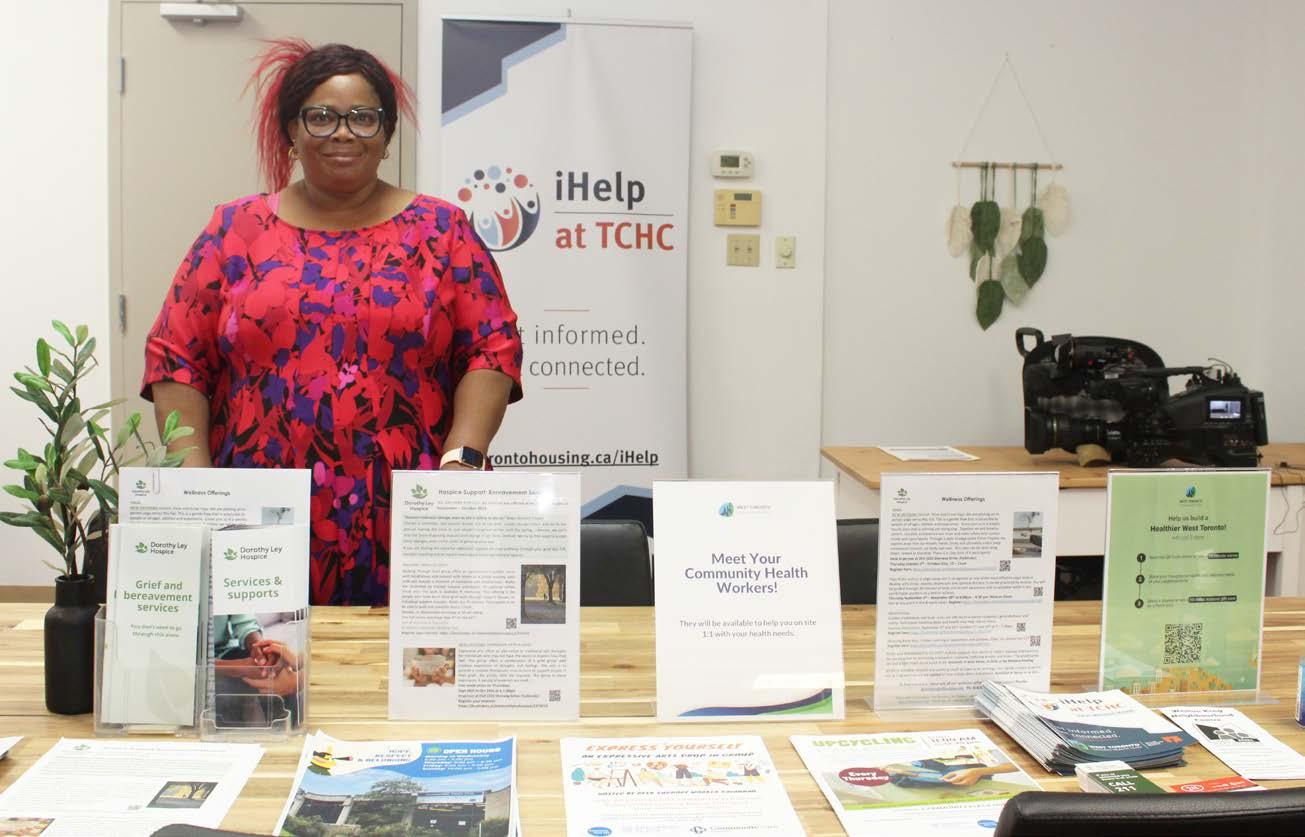
Tenant Olive Noel in the new iHelp Centre space at 1901 Weston Road
Olive Noel, a tenant at 1901 Weston Road who volunteers with the centre, spoke during the grand opening event about the importance of this initiative. “The impact I want to see is with people with special needs,” she said. “I have seen people that are hungry, that have mental issues, and those that cannot get around. People here need help. They need a voice. We need to be the voice for these people.”
Members of TCHC’s Community Safety and Support teams, who work to identify and partner with community agencies and organizations, helped bring the iHelp concept to life.
Kashtin Fitzsimons, Director of the West Toronto Ontario Health Team, agrees and says that “a lot of times, people don’t know where to begin to access care and services.” The aim for onsite staff at iHelp is to become a safe starting point for TCHC tenants and area residents looking for dependable resources.
To learn more about the services and support you can access at the 1901 Weston Road and 100 High Park Avenue iHelp Centres, visit wtoht.ca/ihelp.
Brook Restoration Pre-Apprenticeship Program offers training and opportunities to TCHC tenants
When we visited the Brook Restoration office in north Etobicoke, it was a hive of activity. Several young trainees wore hard hats, orange shirts, and safety vests. Excitement was in the air as they gathered around their instructor, watching intently as he poured concrete into a small wooden box. He then showed them how to spread the concrete evenly and smooth it over.
Nearby, another group could be seen practicing their drilling techniques and using tools to pry apart a few window frames. It was a unique experience that gave us insight into those preparing to embark on a new and exciting career in the trades.
Since 2017, TCHC has partnered with Brook Restoration to offer a 10-week paid preapprenticeship program to youth tenants who are interested in a career in the trades. This apprenticeship is for tenants between the ages of 16 to 29. It features interactive workshops, lectures and mentorship opportunities. The program also includes work placements and certification. Since
Program participants learning in the classroom

2017, many TCHC tenants have been offered full-time jobs upon graduation.
The program is designed to introduce participants to the skilled trades, whether they have prior experience or not. Some participants come to the program with an existing passion for the construction industry. Others are just curious, wanting to try something new.
“Programs like this give youth like me an opportunity to fulfill our potential”
“I found out about this program through word of mouth,” said Jayden Samuels, a tenant from the Rexdale community. “An acquaintance of mine knows a TCHC staff member who supports the program.”
This year, the pre-apprenticeship program consists of three groups of 50 youth each. Participants spend the first two weeks of the program being trained at Brook Restoration. They are then sent to job sites to complete their 8-week placements.
So far, Jayden and his group have been trying their hands at caulking, carpentry,
brick laying, masonry, and more. He’s come a long way since his high school days.
“I dropped out of high school at 17 and was getting into trouble,” recalled Jayden. “Programs like this give youth like me an opportunity to fulfill our potential. Being from the community that I’m from, I’m lucky to have the opportunity to just wake up in the morning and go to work every day.”
Suzi Akasha is from TCHC’s East region. She described her first week in the program as being “a crash course with lots of classroom learning about health and safety” and “the second week more hands-on as we train with tools.”
“There’s a ton of hidden talent in TCHC communities”
Suzi’s professional background is in health care as a support worker. She admits that the trades are completely new to her and outside her comfort zone. Being one of four females in her group, Suzi said that “as a woman, it’s a little overwhelming but I’m glad I’m not the only one interested in the trades. There certainly is a place for women in the industry. After I graduate, I’m going to tell other women they can do it too. I’m going to encourage them to sign up for this program.”
As a general contracting company, Brook Restoration manages projects across Ontario, including several TCHC communities. They are proud to partner with TCHC to offer this program to tenants and believe everyone benefits.
“There are so many jobs out there in the construction industry and we need workers,” explained Mustafa Abdi. He
Program participant Jayden Samuels

is a Program Coordinator with Brook Restoration and grew up in TCHC housing.
“There’s a ton of hidden talent in TCHC communities and programs like this find and leverage their immense skills. While we are breaking down barriers for tenants to join the industry through this program, our company and industry also benefit. It’s a win-win for everyone.”
Romario Duncan, a tenant from the Jane and Trethewey community, says that “programs like this are an outlet for youth to find a new dream; to be inspired, to build something new.” He wishes he had known about this program sooner and believes that he would have been further ahead in life and career. However, he quickly adds “no regrets. I can’t look back. I am here to take this opportunity now.”
For more information on the program, including how to apply, visit brookrestoration.ca/about-the-program. You can also contact Phillip Auguste, Community Services Coordinator, at Phillip.Auguste@torontohousing.ca.

A new year is right around the corner, bringing all sorts of exciting possibilities. What are you looking forward to the most? Will you enrich yourself by learning a new hobby or skill? Are there some events in the city you’d love to attend?
Let us know and you could win a $50 Amazon gift card. Your entry may also be featured in our Spring 2025 issue. This contest is only open to tenants of Toronto Community Housing.
Contest entries can be sent via:
• Email to TenantLOOP@torontohousing.ca
• Direct message to our Facebook page at facebook.com/TorontoCommunityHousing
• Mail to 931 Yonge St., 7th floor, Toronto, ON M4W 2H2 (Attn: Tenant LOOP)
Please submit your entries by Monday, February 10, 2025.


Apply for the Investing in Our Diversity (IIOD) Scholarship
Eligible applicants can receive up to $4,000 to cover tuition fees and school-related expenses for full-time postsecondary education or training.





Attending postsecondary school in September 2025/January 2026
29 years of age or younger (as of April 30, 2025)
Not previous recipients of the IIOD Scholarship

Canadian citizens or permanent residents
Toronto Community Housing tenants or residents of the Scadding Court catchment area (see application for details)
Applications will open Monday, January 20, 2025. For more information, visit torontohousing.ca/iiods.
Founding partners and donors:

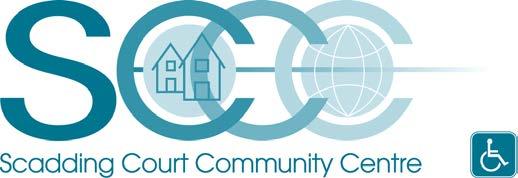

TCHC tenant, employee, and community leader Trevaun Douglas is breaking barriers
In the heart of Lawrence Heights, tenant and community leader
Trevaun Douglas is a beacon of hope and strength.
Trevaun explains, “Growing up in Lawrence Heights, we didn’t have the many resources that we have now. A lot of my peers started going down the wrong path.”
Trevaun chose a different path for himself. At just 11 years old, Trevaun started volunteering as a landscaper in Lawrence Heights and the Neptune community, planting flowers and gardening. His involvement in the community deepened when a TCHC Manager offered Trevaun a volunteer role as a community engagement worker. Since then, Trevaun has been employed full-time by TCHC as a custodian and maintenance worker. This summer, he started a new role as a Community Engagement Coordinator with YouthWorx, a TCHC summer employment program for tenant youth.
Trevaun’s love for his community extends far beyond his day job. In 2019, he started his own grass-roots organization called Mind on Strength which provides support to at-risk youth across his community. Mind on Strength offers mental health workshops and runs a basketball program.

In May 2024, Trevaun walked more than 100,000 steps in 21 hours from Yorkdale Mall in Toronto to Hamilton wearing a 55 lb. weighted vest. His impressive walk raised over $2,600 to fund a spa day event for 10 mothers from the Lawrence Heights community for Mother’s Day. The videos that Trevaun took documenting his walk went viral on social media and he used the attention to raise funds and awareness for other projects in the community.
For Trevaun, these fundraisers and events are a catalyst for change. He also hopes that his work will strengthen the connection between residents during the revitalization process and inspire youth, demonstrating that it’s possible to do anything you set your mind to.
Trevaun recently received the 2024 Ontario Non-Profit Housing Association (ONPHA) Young Changemaker Award for his dedication to his community, and for making a significant impact creating safe spaces for youth and driving social change.
To learn more about Trevaun’s story, you can visit our website at torontohousing.ca/news-and-updates.
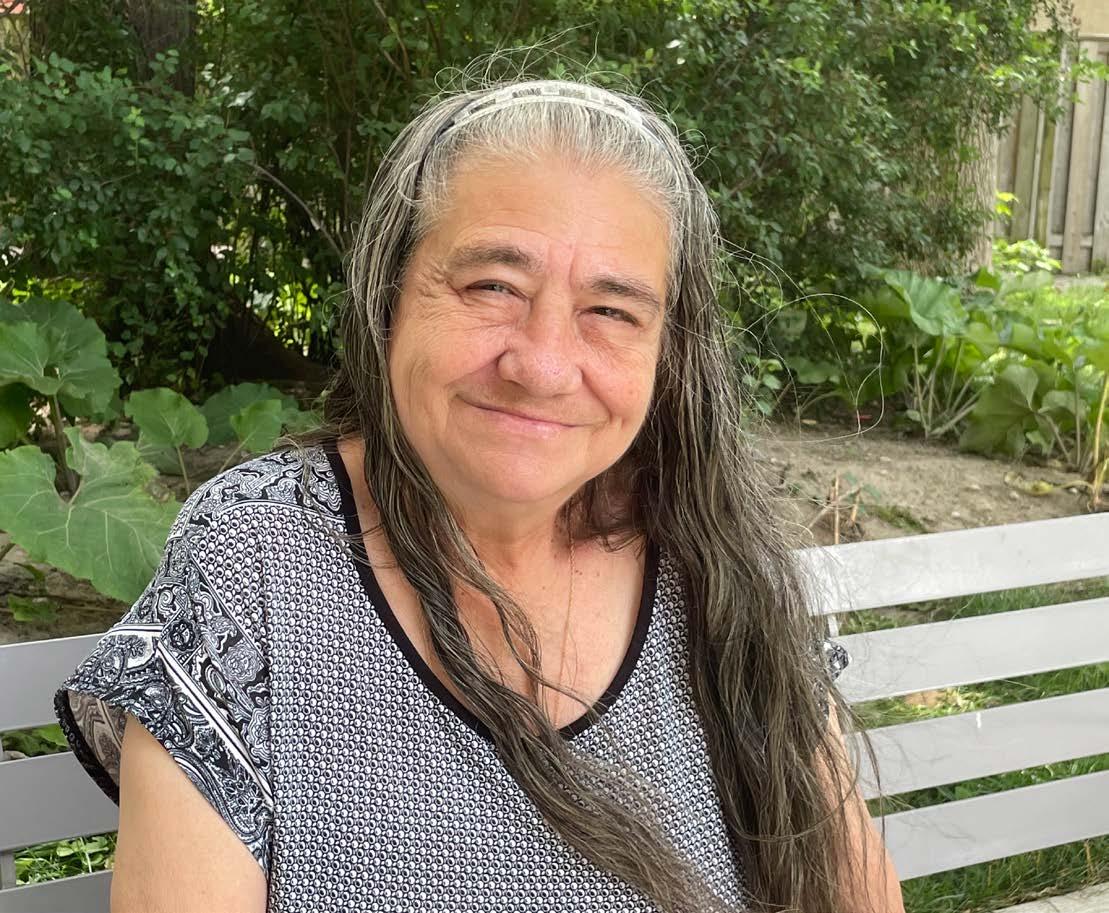
Ilona Bata
When we met Ilona, she greeted us with a twinkle in her eye. Her easygoing demeanor showed a sense of humour and fun. Ilona is well known in the building, having lived at 220 Oak Street for many years. She’s been an active voice in her community and has empowered other tenants to do the same.
As we talked about Ilona’s volunteer work, she spoke candidly about her past. As a former addict to drugs and alcohol, she credits the Salvation Army for turning her life around. As part of her rehab, she volunteered with the Salvation Army for 20 years. She helped in areas like healthcare, a children’s camp, and the food bank. She’s still involved with the Salvation Army today and has brought them into the building to run a prayer session every Thursday.
Ilona was volunteering at the food bank when she felt a strong desire to give back to her community. With that intention in mind, she and a few others started a breakfast club in her building. Through that club, she came to know other tenants. Soon after, Ilona became a tenant representative and started working with Cota, a social agency helping people with mental health
Tenant of 220 Oak Street gives back to her community
issues. “I help them with their programs. Sometimes I decide to cook a meal for everybody,” she said. She also buys fruit for the Cota program so they can give it out to tenants in the morning.
For the last few years, Ilona has been organizing a clothing drive in the building. “I gather clothing, I ask people from all over to donate clothing, then I open the community room, and anybody who wants to come can. They can come from the streets, I don’t mind—it’s for everybody,” she said.
On top of these activities, Ilona has found time to be part of the Regent Park Safety Network and the Regent Park Social Development Team. There she helps with the planning of community events. When it comes to improvements within her building, she said she’d like to see a food bank, better access to medical services, and an exercise program for seniors.
When asked what she finds most rewarding about her volunteer work, Ilona smiled and said, “When people say, ‘ever since you’ve been a tenant rep, this place has been better’. That makes me feel that I’m doing my job.”
To learn more about Cota and the mental health supports they offer, visit cotainspires.ca.

Your comment: My lease says I am responsible for getting insurance for my unit and my belongings. What happens if I don’t have this insurance? Am I covered under Toronto Community Housing’s insurance if something happens?
Our solution: If an incident happens in your unit, like a fire or flood, and your personal belongings are damaged, you will need to cover the cost of replacing your items.
• The average cost to replace everything in a one-bedroom unit is $20,000.
• The average cost of a one-night stay at a hotel is $200.
• The starting cost of a mobility device is $2,000.
Toronto Community Housing’s insurance policy covers damages to the building only. It will not replace your personal belongings if a fire, flood, or another emergency damages your home.
Your insurance costs may be covered
If you get income from Ontario Works or the Ontario Disability Support Program, speak with your case worker to learn more.
Scan the QR code or visit torontohousing.ca/insurance to learn about tenant insurance, your responsibility as a tenant, and how to get started.



Tell us how you’d like to read Tenant LOOP!
Would you prefer to read Tenant LOOP online, or do you still enjoy reading your hard copy? Scan the QR code or visit tchc.qrd.by/tenant-loop-survey to let us know.
